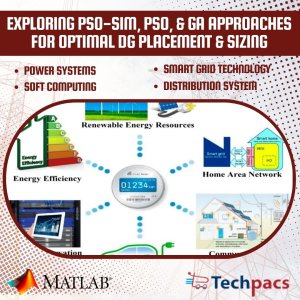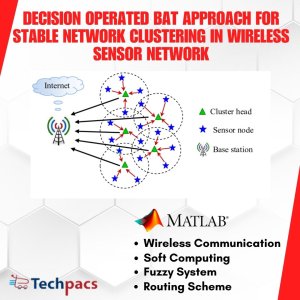Innovative Hybrid Optimization Algorithm for Dynamic PID Controller Tuning in Power System Stability.
Problem Definition
Spontaneous low frequency oscillations (LFOs) have long been a significant issue in the reliability of power systems. These oscillations are linked to signal stability limitations in power systems, which can hinder the transmission of maximum energy and the protection of the system. The lack of synchronizing torque between generators when power systems operate near their stability limits can lead to system instability. To address this, automatic voltage regulators (AVRs) are commonly used to enhance the steady-state stability of power systems. However, the transfer of high volumes of voltage through lengthy transmission lines in large interconnected power systems poses another challenge.
Traditional power system stabilizers (CPSSs) have been introduced alongside AVRs to mitigate the effects of LFOs, but their efficiency tends to degrade when system conditions change or dynamic disturbances occur.
Previous research has explored the use of a Proportional-Integral-Derivative controller based on Particle Swarm Optimization (PSO-FPIDC) to improve stability in a Single Machine Infinite Bus (SMIB) system. This approach considers the speed change (∆ω) and acceleration (∆ω˙) of the SMIB as inputs to the controller. The SMIB model is often utilized to study dynamic system stability, focusing on the relationship between electromechanical torque, angle, and speed fluctuations. While this method offers several advantages, the effectiveness of the stability enhancement achieved through this approach has been limited.
Objective
The objective of the proposed work is to address the issue of spontaneous low-frequency oscillations (LFOs) in power systems by introducing a novel method using a fuzzy PID controller. This involves designing four PID controllers with different technologies, such as fuzzy inference systems and optimization algorithms, to enhance system stability. The primary goal is to develop a self-tuning PID controller that can effectively adapt to the system requirements. By utilizing optimization algorithms like Particle Swarm Optimization (PSO) and a hybrid scheme of Modified Firefly Optimization (MFO) and PSO, the proposed approach aims to improve the performance of the PID controller and enhance dynamic stability in power systems. Through the integration of fuzzy logic, PID controllers, and optimization algorithms, the objective is to provide a comprehensive solution to the issue of LFOs and contribute to advancing control systems in the power sector for reliable and efficient operation.
Proposed Work
Thus, the proposed work aims to address the issue of spontaneous low-frequency oscillations (LFOs) in power systems by introducing a novel method using a fuzzy PID controller. This approach targets the enhancement of system stability by designing four PID controllers with different technologies, such as fuzzy inference systems and optimization algorithms. The primary objective is to develop a self-tuning PID controller that can adapt to the system requirements effectively. To achieve this, an optimization algorithm is utilized to select the optimal coefficients for the PID controller and ensure the fitness of the model. Initially, a Particle Swarm Optimization (PSO) approach is implemented, followed by a hybrid scheme that combines features of Modified Firefly Optimization (MFO) and PSO to enhance the optimization process.
This innovative approach not only improves the performance of the PID controller but also emphasizes the importance of dynamic stability enhancement in power systems.
The rationale behind choosing specific techniques and algorithms lies in the need to overcome the limitations of traditional methods and achieve more effective results. By integrating fuzzy logic, PID controllers, and optimization algorithms, the proposed approach aims to provide a comprehensive solution to the issue of LFOs in power systems. The use of PSO and MFO in the optimization process enables the system to achieve self-tuning capabilities and adaptability, ultimately improving power system stability. This project's approach is driven by the goal of advancing control systems in the power sector and ensuring the reliable and efficient operation of power systems.
By leveraging innovative technologies and algorithms, the proposed work showcases a promising solution to enhance the stability and performance of power systems, contributing to the overall reliability of energy distribution.
Application Area for Industry
This project's proposed solutions can be applied in the power generation and distribution sector, as well as in industries that rely heavily on stable power systems for their operations. The challenges faced by these industries include the occurrence of spontaneous low frequency oscillations (LFOs) that can lead to system instability and affect the reliability of power systems. By implementing the self-tuning PID controllers designed in this project, industries can effectively address these challenges by enhancing system stability and preventing the harmful effects of LFOs.
The benefits of implementing the proposed solutions include improved steady-state stability of power systems, increased energy transfer capabilities, and better protection of the power grid. The use of optimization algorithms such as Particle Swarm Optimization (PSO) and the novel hybrid scheme combining Modified Firefly Optimization (MFO) and PSO ensures that the PID controllers are optimized for maximum performance under various conditions.
This not only enhances the efficiency of power systems but also contributes to the overall reliability and resilience of industrial operations that are dependent on stable power supplies.
Application Area for Academics
The proposed project has the potential to significantly enrich academic research, education, and training in the field of power systems stability. By addressing the issues related to spontaneous low frequency oscillations (LFOs) and system instability, the project offers innovative research methods and simulations that can be applied in educational settings.
The relevance of the project lies in its focus on enhancing the dynamic stability of power systems through the development of self-tuning PID controllers. By utilizing optimization algorithms such as Particle Swarm Optimization (PSO) and a hybrid MFO-PSO scheme, the project aims to optimize the coefficients of the PID controllers to effectively address system requirements.
Researchers in the field of power systems dynamics and control can benefit from this project by using the code and literature to further investigate stability enhancement mechanisms.
MTech students and PhD scholars can utilize the findings to develop new approaches for improving power system stability and reliability.
The technology covered in this project, including optimization algorithms and PID controller design, can also be applied in other research domains such as renewable energy integration, smart grid technologies, and microgrid systems. By incorporating innovative techniques for system optimization, researchers can explore new avenues for enhancing the performance and efficiency of power systems.
In terms of future scope, further research can be conducted to evaluate the performance of the developed PID controllers in real-time power system simulations. Additionally, the project can be extended to investigate the impact of integrating renewable energy sources and energy storage systems on power system stability.
Overall, the project provides a valuable resource for advancing research in the field of power systems dynamics and control, contributing to the development of more reliable and resilient power systems.
Algorithms Used
PSO stands for Particle Swarm Optimization, and it is used in the project to optimize the coefficients (kp, ki, kd) of the PID controller. PSO helps in selecting the optimal values for these coefficients, ensuring the fitness of the model and enhancing the performance of the system.
MFO-PSO is a hybrid scheme that combines features of Modified Firefly Optimization (MFO) and PSO. This hybrid model improves the optimization process further, making the PID controller more effective in meeting system requirements. By incorporating MFO, the algorithm addresses the limitations of traditional PSO, making the optimization process more efficient and enhancing the performance of the system.
Overall, these two algorithms play a crucial role in the project by enabling the development of a self-tuning PID controller that can adapt to system requirements effectively. They contribute to enhancing the stability of power systems and improving the overall efficiency and reliability of control systems in the power sector.
Keywords
SEO-optimized keywords: power system stability, dynamic PID controller tuning, optimization algorithms, hybrid optimization, power system control, stability enhancement, controller parameter tuning, power system dynamics, intelligent control, optimization techniques, power system stability analysis, control system optimization, stability margins, power system modeling, LFOs, automatic voltage regulators, traditional power system stabilizers, Large interconnected power systems, Particle Swarm Optimization, Modified Firefly Optimization, PSO-FPIDC controller, system instability, synchronizing torque, reliability of power systems.
SEO Tags
power system stability, dynamic PID controller tuning, optimization algorithms, hybrid optimization, power system control, stability enhancement, controller parameter tuning, power system dynamics, intelligent control, optimization techniques, power system stability analysis, control system optimization, stability margins, power system modeling, LFOs, low frequency oscillations, signal stability, synchronizing torque, automatic voltage regulators, AVRs, power system stabilizers, traditional power stabilizer, system instability, Particle Swarm Optimization, PSO-FPIDC controller, electromechanical torque, PID controller self-tuning, Modified Firefly Optimization, MFO, control system performance, dynamic stability enhancement, power sector control systems
| Shipping Cost |
|
No reviews found!

















































No comments found for this product. Be the first to comment!